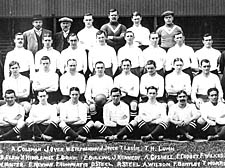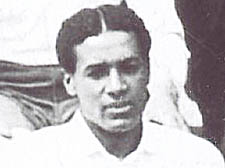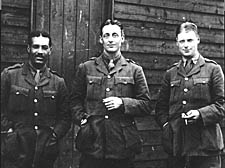|
|
 |
| |

The pre-war Tottenham side
 Walter Tull Walter Tull

Phil Vasili
 Walter Tull with two fellow officers in World War I Walter Tull with two fellow officers in World War I |
Walter the first black officer and footballer
Walter Tull was the second ever black footballer in Britain, and the first black army officer. A new film is to tell his remarkable story, writes Tom Foot
WHEN asked about black footballers the heroic struggles of Cyrille Regis, John Barnes and Garth Crooks come to mind. So do the appalling scenes of bananas being thrown at players in the 1980s, and England flags draped outside pubs with signs ‘saying no blacks or dogs’ above the entrance.
Black footballers have been running out for English sides for well over a century, however.
Arthur Wharton was the first black footballer in the English League, signing as a goalkeeper for Preston North End in 1886.
Walter Tull, however, was the first professional black footballer to play outfield, as a striker for Spurs and Northampton Town.
He was also the first black man to serve as an officer in the British army despite military regulations at the time barring black men from having any positions of rank.
Recommended for the Military Cross – an award established during World War I for acts of supreme individual bravery – his life was cut tragically short by the war – Tull was mown down by German machine gunfire in 1918 during one of the conflict’s last offensives.
His body was never found but Tull’s memory is about to be revived in a feature film scripted by Parliament Hill’s Phil Vasili.
Vasili, who played semi-professional football for Cambridge United until “old age took over” at 40, has written two books on Edwardian black footballers. Amazingly, he is yet to find a publisher for his book on Tull. But his screenplay was snapped up for a feature film to be released next year. The film will star Noel Clarke, who plays Mickey Smith in the current BBC Dr Who series, as Tull alongside Ray Winstone’s daughter Jamie from the teenage blockbuster Kidulthood.
Vasili’s fascination with black footballers is reinforced by his step-father’s West Indian roots but began when he found an old annual in a jumble sale. He noticed black players illustrated in the Boys Book of Soccer and began his research at Essex University, embarking on a doctorate in Football Hooliganism and Popular Protest.
The story of Tull has had a profound impact on Vasili, who lives in Lissenden Gardens in Parliament Hill.
Born in Folkestone in 1888 Walter Daniel John Tull was the son of a Barbadian carpenter and former slave. who had married a white woman. After his parents died Tull and his brother Edward were sent to a Methodist orphanage in Bethnal Green, now The Museum of Childhood.
Vasili tells how archived logbooks from the orphanage revealed Tull as a “stoic, laid back character, but single-minded”.
Tull was apprenticed as a printer but, a promising young footballer, he began his playing career at amateur Clapton in 1908 winning three amateur trophies.
He was soon talent spotted by Tottenham Hotspur and in 1909 became only the second black man to play professional football in Britain.
Two years later he was transferred to Northampton Town for whom he played 110 games and established himself as one of the fans’ favourites.
The outbreak of war in 1914 saw him volunteer for the army – although he was still in demand as a player – Glasgow Rangers were in talks with Northampton to buy him. Tull signed up to the 1st Football Battalion of the Middlesex Regiment and again Tull excelled – he was soon promoted to sergeant.
In 1916 he took part in the Battle of the Somme and later returned to England suffering from trench foot.
When he recovered Tull was sent to officer school in Scotland, even though there was a bar on black people serving as an officer.
Despite this, Tull was made a lieutenant and so became the first ever black officer in the British army. He was posted to Italy, where he was mentioned in despatches for his bravery, and then sent back to France in 1918 after being promoted to 2nd lieutenant. During an assault on the German lines Tull was hit.
A newspaper reported how “a machine gun bullet pierced his neck and came out just beneath his right eye”.
One of his squad rushed to his rescue. The loyal soldier dragged his body for hundreds of yards, according to the report, before leaving him in the fields as the Germans advanced. Tull’s body was never recovered.
Vasili says: “He believed in the idea of muscular Christianity. Physical weakness was considered to be unnatural because it was only a reflection of moral spiritual weakness. So people tried to overcome physical weakness as an effort to be Christian, moral, and good.”
“There was actually a law that prevented men of ethnic descent from taking military rank,” Vasili continues. “To be put forward as an officer, to be accepted as a man who people would look up to and take orders from is quite incredible.”
After interviewing Tull’s great-granddaughter, who lives in Scotland, Vasili found letters showing that Tull was due the military cross for individual bravery after stopping an Italian assault single-handedly.
A socialist who was deeply involved in the anti-racism movement during the 1980s, Vasili has a research project on black radicals in the pipeline and feels the communist influence on British culture is yet to be properly documented.
“History changes so quickly,” he reflects. “I read a story about a rapper who didn’t know the word nigger was derogatory. Stories like Walter Tull are forgotten so easily. That is why it is so important to tell them over and over again.” |
| |
|
 |
|